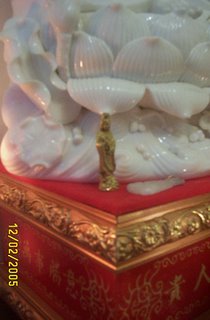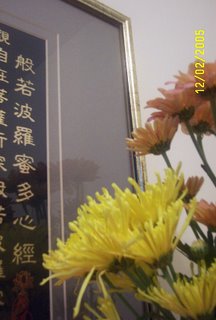Tuesday, March 28, 2006
Where do clever Malaysians go? (Part 3)
This young boy has been profiled as a maths whiz kid, but there are may more children with individual capabilities and intelligences which does not fit the learning environment in the schools. Hence, they find lessons boring and likely to end up falling to the back of their class. Many speakers have spoken about this including Prof Chiam Heng Keng of University Malaya.
Source http://thestar.com.my/news/story.asp?file=/2006/3/25/nation/13773414&sec=nation
The Star Online > Nation
Saturday March 25, 2006
Whiz kid can go to school of parents’ choice
PETALING JAYA
Seven-year-old Adi Putra Abdul Ghani (pic), who fascinated Malaysians with his ability to solve Additional Mathematics problems, can study at any school of his parents’ choice.
Education Minister Datuk Seri Hishammuddin Tun Hussein said yesterday: “The ministry has organised some programmes for him but we are not forcing anyone to do it. “If his father wants him to change schools, I have no problems with that. Just send in the application and I will approve it.”
Abdul Ghani Abdul Wahab, 48, had said on Thursday he would appeal to the Education Ministry to allow his son to study at Sekolah Islam Antarabangsa or at a private school that would allow him to have a more flexible education.
Friday, March 24, 2006
Where do clever children in Malaysia go? (Part 2)
It will be interesting to see how this situation develops into an action plan. (Reade the full STAR article belo)

The Star Online > Nation (Source: http://www.thestar.com.my/news/story.asp?file=/2006/3/24/nation/13762330&sec=nation)
Friday March 24, 2006
Genius finds school boring
By CHRISTINA KOH
IPOH: Young maths whiz Adi Putra Abdul Ghani, who fascinated Malaysians with his ability to solve Additional Mathematics problems, faces the possibility of being thrown out of his primary school.
The parents of the seven-year-old boy have received show-cause letters from his school, SK Jalan Matang Buluh in Bagan Serai, warning them that he could be expelled for cutting classes too often.
His mother Serihana Elias, a former teacher, said her son was reluctant to go to school because he was bored with the basic syllabus of reading, writing and counting (mengira) laid down by the Education Ministry.
Adi Putra, who could read newspapers by the age of four, had told his mother that he would prefer studying at a school like Sekolah Islam Antarabangsa in Kuala Lumpur.
There, she said, he could learn languages like Japanese, French, English, Chinese as well as tahfiz al-Quran studies. They were in the process of enrolling their son there, Serihana said.
“I’m disappointed that SK Jalan Matang Buluh issued the warning letter to my son in February. Some might think we are exploiting Adi Putra, but he himself said that he was bored in school,” she told reporters here yesterday.
His father Abdul Ghani Abdul Wahab, 48, said he would appeal to the Education Ministry to allow his son to study at Sekolah Islam Antarabangsa or a private school that would allow him to have a more flexible education.
Where do clever children in Malaysia go?
Another reason why we need to relook at our education system - not just revamp of examinations systems.
Where do clever children in Malaysia go? Trinity College in Melbourne could be a start.
Thursday, March 16, 2006
Our Education System - what's happening?
Are our headmasters corrupted (in Chinese Schools) as alleged by a certain Mr Ong Koh Hou who offers a reward of RM500,000 for information and evidence of corruption by headmasters in Chinese primary schools and the Federation of Chinese School Headmasters (FCSH) is fighting back...the saga continues.
"A Chinese primary school is offering places to the highest bidders, starting with a minimum donation of RM300." That was the first sentence in a report in the New Straits Times on Mar 9, 2006. Some parents have told me that more than one (especially the more popular ones) gives greater consideration to parents to makes donations to the school. Well, I guess the basic rule of supply and demand rules.
Just when we think our kids are way past the primary level and we are considering which local university to send our kids to, Dr Azmi Sharom, an associate professor of the Law Faculty of University Malays wrote an open letter to The Star on March 11, 2006 expressing what some parents felt about our local universities.

Recently we were all told how good our form 5 students are with an increase of 43% students scoring straight 1As, 945 students scored straight A1s, 283 more than last year. Nevermind if you have 15A1s + 1A2 does not qualify you as a top student (this student has only a 95% A1s). It is interesting to note why are more and more students are scoring straight As compared to 10-20 years ago. I hope it is not a situation of "shiok sendiri" (self gratification).


Its seems okay when ONLY one student tried to kill herself by jumping off the third storey of her school building because she was not too pleased with her results. I hope this not a sign of things to come. Can we tell our children it's okay, that academic achievement is not the only defining criteria of success?

Congrats to our Education Minister daughter, Nasha Alyssa she scored 9As in SPM examination. She had scored 8As in PMR and 5As in UPSR. If you do not know yet, she is now studying at Trinity College in Melbourne doing her foundation studies). What happened to out local 6th Form and local universities.
So, if you want to know what's happening out there in our education system, take the cue from our Education Datuk Seri Hishammuddin Tun Hussein.
I am seriously considering looking for a second job to prepare my kids to go to the Trinity College in Melbourne.
Saturday, March 11, 2006
An open letter to Mustapa - THE STAR Saturday March 11, 2006
THE STAR Saturday March 11, 2006
An open letter to Mustapa
Dear Sir,
Firstly, allow me to congratulate you on your new posting. It must be said though that you are not to be envied, for you are now faced with a Herculean task.
But, where are my manners? You have no idea who I am. I could be a complete nutcase.
Well, I’m an academic in a Malaysian public university. Which some people might consider a nutcase, anyway. But I’m very proud to be an academic.
It’s a noble profession, and it matters not that my students earn more than me within a few years of graduating and that little children run screaming from my hideously outdated clothes. It’s a calling to be an academic, and I care passionately about it.
That is why I’m writing to you. You see, there is much that is wrong with our universities and much that can be done by the Ministry to put things right.
You may not believe that my one purpose in writing to you is the improvement of our institutions, but let me assure you, we true academics (as opposed to wannabe politicians in lecturers’ clothes) don’t have hidden agendas.
Over the past few years, there has been this mantra chanted by the Government and university leaders: “We want our universities to be world-class universities.” Unfortunately, this mantra does not have any explanatory notes, so we don’t really know what “world-class” means. However, let us assume that a world-class university has the following:
- Graduates who are employable, not only here but also abroad;
- Academic staff who are respected worldwide;
- Research and publications that are recognised by reputable international journals/publishers;
- An academic programme that is recognised worldwide;
- An academic atmosphere that can attract quality national and foreign students and staff.
If we accept these criteria as valid, what then can be done to achieve it?
Universities are not hampers
Universities are not rewards to be handed out. It has happened in Terengganu and the same has been promised to Kelantan. “Vote for us and we will give you a university.”
This may make political sense, but it does not make any academic sense. A lot of planning is needed to ensure that the resources are sufficient to create a university of quality.
Malaysia is not a very rich country – we can’t afford petrol subsidies, for goodness’ sake – and we definitely can’t afford to stretch our limited economic and intellectual resources to build universities in such a blasé manner.
Universities are not fast-food joints
They should instead be high-class restaurants. Universities have to be elitist in order to produce quality research and graduates.
An elitist university means that only the best candidates are taken in as students and only the best staff are hired. Classes and exams can then be pitched at a higher standard.
Furthermore, the resulting smaller student numbers mean seminars and tutorials can be truly conducive to discussions, and lecturers will have less of a teaching burden in order to concentrate on research.
This is not to say that higher education as a whole must be elitist. There are other forms of higher education institutions that can cater to school leavers who don’t make the cut, such as polytechnics and community colleges.
If you love your universities, you must set them free
Academics and students must be free to think and to express themselves.
Yes, I understand that this is Malaysia and freedom is seen as a dirty word by some, but without it, there is little hope of achieving “world-class” universities.
Intellectualism cannot grow in a repressive atmosphere.
We all know that in this country, there are many laws that restrict our freedom to express ourselves, but the irony is that for lecturers and students there are additional laws levelled at them.
You must be aware of the University and University Colleges Act – that wonderful piece of legislation designed to ensure that university students are little more than secondary school pupils.
You may not be aware, however, of the Statutory Bodies Discipline and Surcharge Act which affects academics who are the employees of statutory bodies.
According to this law, we can’t say anything for or against government policy without getting ministerial permission first.
Now, this may be all right for a mathematician quietly thinking up new formulae with which to calculate the possibility of Malaysia ever qualifying for the World Cup.
But for social scientists, it is akin to having the Malaysian football team play football without using their feet (which is perhaps something that they do anyway, looking at previous results).
The simple fact of the matter is that universities should first and foremost be the birthplace of ideas and original thought, discussion and debate, and this can’t be achieved with such laws hung around our necks.
And in case you’re worried that greater freedom will make our campuses hotbeds of radicalism, please let me put your fears to rest.
The number of students in this day and age who really care about matters beyond Akademi Fantasia is very small indeed.
Most students just want to graduate and as quickly as possible get into debt to pay for their three-bedroom flat and Proton Waja.
Universities need Mandelas
If there is one thing that Malaysian universities need, it is good leadership. And by a good leader, I mean a Vice-Chancellor who has the qualities of an outstanding intellectual, manager and diplomat, who can ensure that academic principles are paramount, not political expediency.
That promotions are given based on merit, not patronage. That students are treated like adults, not children. And finally, that the university is run on the highest ideals of civilisation and intellectualism, not self-aggrandisement and base toadying.
An outstanding academic leader, someone who can efficiently organise the place, represent the institution with dignity and command the respect of those working under him, or her, is a rare creature indeed.
To seek out such a person, may I suggest that the search committee your predecessor was talking about be made a reality.
This search committee, however, must be independent and transparent. It must not be hiHndered by any political agenda and must instead pick the candidates based on ability – and ability alone. Factors such as race, creed, gender and nationality should not be a consideration.
Perhaps we’d like to take lessons from elsewhere. Oh, before you think I’m suggesting a “study trip” abroad (with the usual sightseeing and cultural diversions), let me make it clear that I think the taxpayers’ money need not be wasted in such a fashion. After all, writing an e-mail is probably all you need to do to get the necessary information.
You may wish to start with New Zealand universities. I say New Zealand because the VC of Auckland University was recently poached by Oxford to be its Vice-Chancellor. The first non-English VC of Oxford since, well, since forever.
Now, that’s world-class, don’t you think? And from a country much smaller than us where the sheep outnumber the humans. Amazing.Well then, Sir, I think I’d best sign off now. You must have loads to do. Oh, before I forget, if you want to lighten the workload of your officers, may I make a last suggestion?
Why don’t you just leave the day-to-day running of the universities in the hands of the universities? I bet the Ministry has enough on its plate without having to decide about trivial things like professorial promotions and the approving of leave for academics to go to conferences and holidays overseas.
Anyway, thanks for taking the time to read my letter. Good luck with your endeavours. Until next time, I remain,
Yours sincerely,
AZMI SHAROM
Dr Azmi Sharom is an associate professor of the Law Faculty of Universiti Malaya
Sunday, March 05, 2006
Sunday School today
It has been a challenge trying to talk about Buddhism to kids in my Sunday School class who (most of them) did not want to there in the first place. Their parents of course decided that Sunday Dharma School was something good for them. It has been a struggle over the past 2 months to try to understand and tune into the frequency of the students aged between 15 - 21 years.
I personally felt that I had an interesting session this morning. I felt I could connect with (at least a couple) of the students of my class. I felt I got some of the students thinking about their actions, their lives and what they really want.
More importantly, this morning's session today was a reminder for me, a reminder that the life of the Buddha is not just an exercise in religious history. It is reminder for me that the Buddha is alive and that his spiritual journey mirrors my own spiiritual journey and that I must strive continue to look inwards, not to forget my friends and famil as Kalyana Mitrata is the whole of spiritual practice.
I do hope some of my students share similar thoughts with me and appreciate the inherent buddha-citta.
Saturday, March 04, 2006
spiritual peace at home

The Prajnaparamita Heart Sutra, reminds me of the trancient nature of all things including suffering and difficulties. The offering of flowers is a physical reminder.
sometimes the little things in life counts....................


Sabbe Satta Sukhi Hontu!
KV

